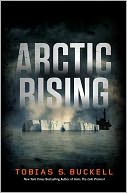Arctic Rising, by Tobias Buckell

The protagonist is Anika Duncan, an airship pilot for the U.N. Polar Guard who gets shot down after discovering a nuclear missile being smuggled into the Arctic. She soon finds herself in the middle of a global power struggle. The Gaia Corporation have devised a plan to reverse global warming, but the technology can also be used as a deadly superweapon. (And I can’t say what the technology is without spoiling things, which sucks, because it’s pretty darn cool.)
I like the extrapolation Buckell has done on a world where the icecaps continue to melt and the oceans continue to rise. He’s done his research, and it shows. (Some aspects of the book should be familiar to anyone who reads his blog.) The dwindling ice caps create a rush to tap previously inaccessible oil reserves, leading to a proliferation of arctic settlements and colonies. Those settlements in the arctic have a bit of a science fiction feel as well, which was fun. Yes, I’m reading the book through more of an SF lens than a thriller one.
This was a pretty fast read, with colorful characters, a bit of dangerous romance, international intrigue, spies, guns, all leading to a desperate, high-stakes climax.
If you’re familiar with Buckell’s work, this book has some of his trademarks: awareness that there’s more to the world than the United States; significant nonwhite characters (Anika is neither white nor straight); sailing ships written by someone who’s actually lived on one; and lots of action.
Given that climate change is a hot political topic right now, I suspect some readers will denigrate the book as leftist liberal propaganda, and that’s unfortunate. I’ll admit there were a few points early on where I felt like the message started to overtake the story. But then I started wondering if this was due to the fact that in the U. S., any mention of climate change has become so highly politicized. In other words, it’s not that Buckell is preaching; it’s more that political groups have been screaming and squawking and flat-out lying at me about global warming issues for so long that it affected my reading of the book, which is unfortunate.
Overall, Arctic Rising does exactly what good science fiction is supposed to do: examines the current science and research, makes predictions about the future, and writes a rousing story about that future.
This book comes out on February 28.






Some reviews of Arctic Rising (i.e.: my new book is about to drop, ya’all) at Tobias Buckell Online
February 21, 2012 @ 2:13 pm
[…] But anyway, here are some things people are saying about it: This was a pretty fast read, with colorful characters, a bit of dangerous romance, international intrigue, spies, guns, all leading to a desperate, high-stakes climax. Jim Hines […]